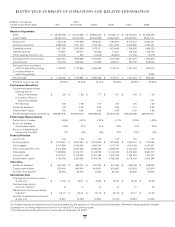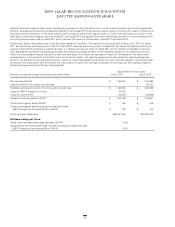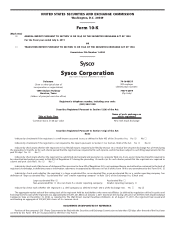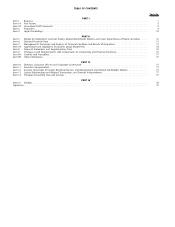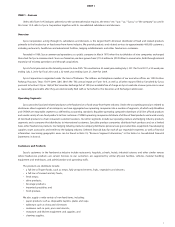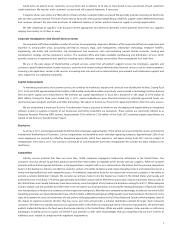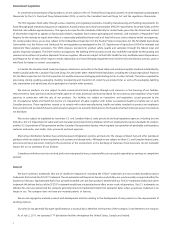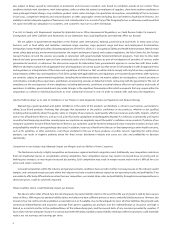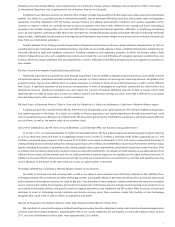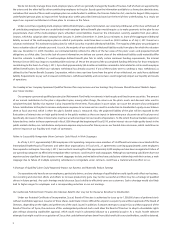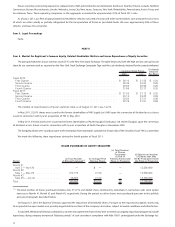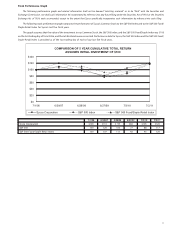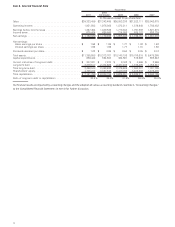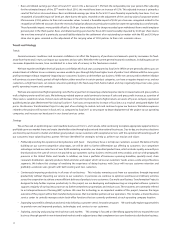Sysco 2011 Annual Report Download - page 28
Download and view the complete annual report
Please find page 28 of the 2011 Sysco annual report below. You can navigate through the pages in the report by either clicking on the pages listed below, or by using the keyword search tool below to find specific information within the annual report.Government Regulation
As a marketer and distributor of food products, we are subject to the U.S. Federal Food, Drug and Cosmetic Act and regulations promulgated
thereunder by the U.S. Food and Drug Administration (FDA), as well as the Canadian Food and Drugs Act and the regulations thereunder.
The FDA regulates food safety through various statutory and regulatory mandates, including manufacturing and holding requirements for
foods through good manufacturing practice regulations, hazard analysis and critical control point (HACCP) requirements for certain foods, and the
food and color additive approval process. The agency also specifies the standards of identity for certain foods, prescribes the format and content
of information required to appear on food product labels, regulates food contact packaging and materials, and maintains a Reportable Food
Registry for the industry to report when there is a reasonable probability that an article of food will cause serious adverse health consequences.
For certain product lines, we are also subject to the Federal Meat Inspection Act, the Poultry Products Inspection Act, the Perishable Agricultural
Commodities Act, the Packers and Stockyard Act and regulations promulgated by the U.S. Department of Agriculture (USDA) to interpret and
implement these statutory provisions. The USDA imposes standards for product safety, quality and sanitation through the federal meat and
poultry inspection program. The USDA reviews and approves the labeling of these products and also establishes standards for the grading and
commercial acceptance of produce shipments from our suppliers. We are also subject to the Public Health Security and Bioterrorism Preparedness
and Response Act of 2002, which imposes certain registration and record keeping requirements on facilities that manufacture, process, pack or
hold food for human or animal consumption.
In Canada, the Canadian Food Inspection Agency administers and enforces the food safety and nutritional quality standards established by
Health Canada under the Canadian Food and Drugs Act and under other related federal legislation, including the Canada Agricultural Products
Act, the Meat Inspection Act, the Fish Inspection Act and the Consumer Packaging and Labeling Act (as it relates to food). These laws regulate the
processing, storing, grading, packaging, marking, transporting and inspection of certain Sysco product lines as well as the packaging, labeling,
sale, importation and advertising of pre-packaged and certain other products.
We and our products are also subject to state, provincial and local regulation through such measures as the licensing of our facilities;
enforcement by state, provincial and local health agencies of state, provincial and local standards for our products; and regulation of our trade
practices in connection with the sale of our products. Our facilities are subject to inspections and regulations issued pursuant to the
U.S. Occupational Safety and Health Act by the U.S. Department of Labor, together with similar occupational health and safety laws in each
Canadian province. These regulations require us to comply with certain manufacturing, health and safety standards to protect our employees
from accidents and to establish hazard communication programs to transmit information on the hazards of certain chemicals present in products
we distribute.
We are also subject to regulation by numerous U.S. and Canadian federal, state, provincial and local regulatory agencies, including, but not
limited to, the U.S. Department of Labor and each Canadian provincial ministry of labour, which set employment practice standards for workers,
and the U.S. Department of Transportation and the Canadian Transportation Agency, which regulate transportation of perishable and hazardous
materials and waste, and similar state, provincial and local agencies.
Most of our distribution facilities have ammonia-based refrigeration systems and tanks for the storage of diesel fuel and other petroleum
products which are subject to laws regulating such systems and storage tanks. Although we are subject to other U.S. and Canadian federal, state,
provincial and local provisions relating to the protection of the environment or the discharge of materials, these provisions do not materially
impact the use or operation of our facilities.
Compliance with these laws has not had, and is not anticipated to have, a material effect on our capital expenditures, earnings or competitive
position.
General
We have numerous trademarks that are of significant importance, including the SYSCO»trademark and our privately-branded product
trademarks that include the SYSCO»trademark. These trademarks and the private brands on which they are used are widely recognized within the
foodservice industry. Approximately half of our privately-branded sales are from products labeled with our SYSCO»trademark without any other
trademark. We believe the loss of the SYSCO»trademark would have a material adverse effect on our results of operations. Our U.S. trademarks are
effective for a ten year period and the company generally renews its trademarks before their expiration dates unless a particular trademark is no
longer in use. The company does not have any material patents or licenses.
We are not engaged in material research and development activities relating to the development of new products or the improvement of
existing products.
Our sales do not generally fluctuate significantly on a seasonal basis; therefore, the business of the company is not deemed to be seasonal.
As of July 2, 2011, we operated 177 distribution facilities throughout the United States, Canada and Ireland.
4




